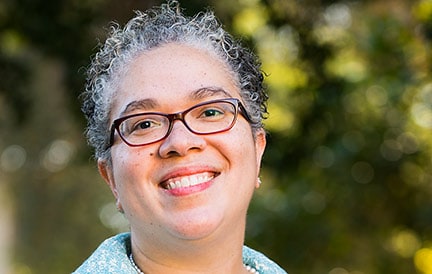Viewpoint: ‘Pomona opens doors, we don’t close them’

Pomona College President G. Gabrielle Starr. Photo/courtesy of Pomona College
The following, titled “Pomona Opens Doors, We Don’t Close Them,” was written by Pomona College President G. Gabrielle Starr. It was emailed to alumni Monday and shared with Pomona College’s campus community on February 16:
We are living through a time of horrific warfare and growing threats to discourse and democracy. In such times, people of good faith struggle to know how to bring us closer to a more just and peaceful world. At this difficult moment, we must not only hold fast to our values but also pursue a path forward that unites us, rather than divides us.
In the days ahead, the Associated Students of Pomona College (ASPC) will host a symbolic, non-binding student referendum on a series of questions, including pursuing an academic boycott of Israel and divestment from all companies aiding Israel. There are many ways to help heal a broken world. This is not one of them.
I understand why so many in our community feel called to action as they witness the vast suffering and loss of life of Palestinians and Israelis in the Middle East conflict. From their differing vantage points, I have heard our students speak out with deep grief and an overwhelming sense that something must change in our world.
In recent days, I spent time listening to the elected leaders of ASPC and explained my concerns about the forthcoming referendum. I suggested alternative approaches to examining the issues it raises, including a meeting with members of the Board of Trustees. I am saddened that the ASPC Senate has decided to proceed even announcing the vote to students before sharing the referendum text, because I believe that the referendum will be painful for our community.
As this vote unfolds, I call on our community to treat each other with care, and to refuse personal attacks as we affirm who we are at our best.
My concerns about the referendum are deep, and come down to not only who I believe we are, but how I believe we should tackle difficult questions.
The referendum seeks to reduce a complex moral issue to a series of yes or no questions. It threatens to undermine our community in its diversity, and divides us by offering a set of one-sentence litmus tests for justice.
The referendum provides no path for informed debate or discussion while offering as settled “definitions” a set of highly debatable and hotly contested propositions, and thus ignores the principles of good governance and the educational mission of our community.
For many years now, the only nation on which ASPC has focused its activity is the world’s only Jewish state. This singling out of Israel raises grave concerns about the referendum’s impact on members of our community.
For this reason, and even though I know our students do not intend this, the referendum raises the specter of antisemitism, and it takes place against the backdrop of a challenging and even worsening national and international climate in which hate is despicably on the rise.
Even as the authors of the referendum are standing up for a principle they believe in, the call for an academic boycott undermines the core principles of who we are as an institution.
As a campus community devoted to openness, learning and mutual respect, we need to find our way to common ground in the face of sharply divergent commitments. We must affirm our values, recommitting to what unites us, and rather than heeding a call for repudiation and isolation, we must open inquiry, and reassert our human ties.
Pomona opens doors, we don’t close them: Students and scholars from all countries, including Israel, will always be welcome here. To exclude anyone from the pursuit of knowledge on the basis of the country in which they live is contrary to our mission.
American and global institutions, should, far from participating in academic boycotts of other institutions, be seeking to engage deeply with Israeli and Palestinian universities in the coming days and years. Throughout the history of American higher education, we have, at our best, lowered the walls that separate us, and made our world smaller and more united. Pomona led the charge to ensure that undocumented and DACA-mented students had access to admissions and financial aid not just at Pomona but across the country. We organized a coalition of colleges and universities to ease the applications of refugees from conflicts like what we are witnessing in Israel and Gaza, welcoming those students to our institutions.
At no point have we taken sides.
Times of conflict call for more engagement, not less. For Pomona and other institutions to thrive, and for our country and world to do so too, we must focus not only on what it is we stand against, but what we stand for: our common humanity.
I assert to our entire Sagehen community that Pomona stands for a united world, and we will continue to be here for everyone.
Sincerely,
Gabrielle Starr
President, Pomona College







0 Comments